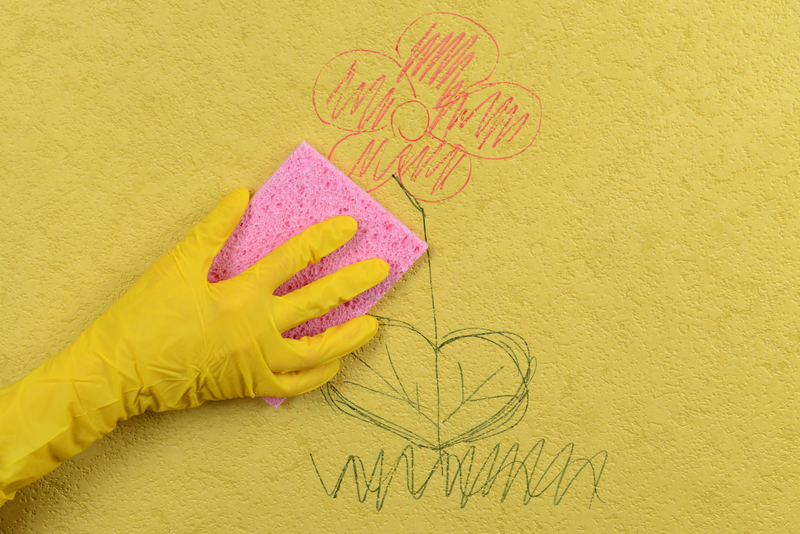Combat Unpleasant Moist Scents Effortlessly
Posted on 07/09/2025
Combat Unpleasant Moist Scents Effortlessly: The Ultimate Guide
Are you tired of battling persistent moist odors in your home, basement, or clothes? Moist scents are more than just an inconvenience--they can indicate underlying issues such as mold, bacteria, or poor ventilation. Fortunately, you can combat unpleasant moist scents effortlessly with the right strategies. This comprehensive, SEO-optimized article will guide you through everything you need to know to banish those musty smells forever.
Understanding the Causes of Moist Scents
Before you can eliminate unpleasant moist odors, it's important to understand why these smells develop in the first place. Moist scents commonly arise in places where excess moisture lingers, leading to the growth of mold, mildew, and bacteria. These organisms love damp, dark environments and multiply quickly when the conditions are right.
The Science Behind Moist Odors
- Mold and Mildew Growth: When moisture collects in an area, microscopic spores from mold and mildew land, germinate, and multiply. These organisms produce volatile organic compounds (VOCs), which are the primary culprits behind musty, unpleasant odors.
- Bacteria: Similar to mold, bacteria thrive in damp conditions, especially in fabrics, carpeting, and porous surfaces.
- Poor Ventilation: Without proper airflow, moisture gets trapped, escalating the problem and making it much harder to combat moist scents.

Top Areas Prone to Moist Odors
Recognizing where moist scents are most likely to form will help you fight unwanted smells proactively. The most common problem areas include:
- Basements and cellars
- Bathrooms
- Laundry rooms
- Closets
- Garages
- Attics
- Storage boxes and containers
- Fabrics and upholstery
- Mats and carpets
Why Should You Combat Moist Scents?
Eliminating moist and musty odors isn't just about maintaining a pleasant-smelling space. Persistent moist scents may harm your health. Prolonged exposure to mold and mildew can trigger respiratory conditions, allergies, headaches, and worsen asthma symptoms. Keeping your home and belongings scent-free ensures a healthier, more inviting environment.
Quick Wins: How to Combat Unpleasant Moist Scents Immediately
You're not powerless against musty odors! Here are immediate actions you can take to combat unpleasant moist scents effortlessly:
- Ventilate: Open windows and doors frequently to allow fresh air to circulate and reduce humidity.
- Wipe Down Surfaces: Use a vinegar solution or antimicrobial cleaner to clean surfaces harboring moisture.
- Remove and Wash Fabrics: Take down curtains, wash linens, and clean removable upholstery covers using hot water to kill mold spores and bacteria.
- Use Baking Soda: Sprinkle baking soda on carpets or inside shoes and closets. Let it sit for hours before vacuuming to deodorize and absorb moisture.
- Dry Out Problem Areas: Use fans or dehumidifiers to remove excess moisture from the air and surfaces.
- Inspect for Leaks: Check for plumbing leaks under sinks, behind appliances, and in basements. Even small leaks can fuel persistent odors.
Dehumidifiers: Your Secret Weapon Against Moisture
One of the most effective ways to combat moist odors effortlessly is to use a quality dehumidifier. These devices extract moisture from the air, making it harder for mold and mildew to flourish. For best results:
- Choose a dehumidifier sized appropriately for the room.
- Empty and clean the water reservoir regularly.
- Maintain indoor humidity below 60%. The ideal range is around 30-50%.
- Pair with fans for maximum air circulation.
Comprehensive Strategies to Combat Moist Odors Long-Term
For lingering or severe issues, short-term fixes may not be enough. Here are comprehensive, long-term solutions that ensure you'll combat moist scents effortlessly and permanently.
1. Improve Home Drainage and Insulation
- Seal Foundation Cracks: Even tiny cracks in your home's foundation or walls can let in moisture. Seal these with appropriate waterproofing products.
- Add Vapor Barriers: Use vapor barriers or moisture-resistant insulation in basements, crawl spaces, and attics to block moisture ingress.
- Direct Water Away: Ensure gutters and downspouts direct water away from your home.
- Grade soil around your house so water flows away, not toward your foundation.
2. Regular Cleaning Routines
Routine cleaning prevents the buildup of odors and stops mild problems from turning into major ones. Some best practices include:
- Wash towels, curtains, and bedding regularly in hot water.
- Vacuum carpets and rugs weekly. Deep clean at least quarterly.
- Clean bathroom and kitchen surfaces with mold-inhibiting cleaners.
- Don't let laundry linger; wash damp clothes immediately.
- Rotate and air out shoes and outerwear frequently.
3. Use Natural Deodorizers and Absorbers
Sometimes, chemical sprays only mask the problem temporarily. Instead, opt for natural odor absorbers:
- Charcoal Bags: Activated charcoal is excellent at absorbing musty smells. Place bags in shoes, drawers, or closets.
- Baking Soda: Fill dishes with baking soda and leave in problem areas.
- White Vinegar: A bowl of white vinegar in a musty room will neutralize odors naturally.
- Essential Oils: Tea tree, eucalyptus, lavender, and lemon oil have antifungal properties that disinfect as well as freshen the air.
Targeting Specific Problem Areas
Certain locations and items require specialized treatment to eliminate moist odors.
Combatting Bathroom Moist Scents
- Install an exhaust fan and run it during and after showers.
- Wipe down tiles and shower curtains after use with a squeegee.
- Wash bathmats and towels often.
- Use grout sealer to prevent mold in tile lines.
Banishing Musty Closets and Wardrobes
- Keep closet doors open occasionally to allow air to circulate.
- Never store damp clothes or shoes inside.
- Use cedar blocks, silica gel packets, or charcoal bags.
- Install a small dehumidifier if space allows.
Defeating Damp Kitchen Odors
- Don't let garbage linger; take it out daily.
- Check under sinks for leaks or pooling water.
- Keep pantry items dry; use airtight containers.
- Clean refrigerator drip trays regularly.
Clothing and Soft Furnishings: Getting Rid of Trapped Moist Scents
Clothes, bedding, and upholstery are prone to absorbing and holding onto moist odors. To treat these effectively:
- Wash with Vinegar: Add one cup of white vinegar to your laundry load. Vinegar kills bacteria and neutralizes odors.
- Sun Dry: Hang items in direct sunlight--UV rays disinfect and fresh air removes mustiness.
- Vacuum Upholstery: Use an upholstery brush to draw out embedded dust and spores.
- Use Odor-Eliminating Sprays: Opt for natural or enzymatic sprays to break down odor-causing molecules.
When Moist Odors Point to Bigger Problems
Sometimes, no matter how much you clean, unpleasant moist scents persist. This could indicate:
- Serious plumbing leaks inside walls or floors
- Hidden mold colonies
- Structural water damage
- Poor insulation or inadequate home ventilation systems
In such cases, it's crucial to consult professionals. Mold remediation experts, plumbers, or home inspectors can locate and address the root cause, ensuring your home remains safe and fresh-smelling.
Pro Tips for Effortlessly Preventing Unpleasant Moist Scents
Prevention is always easier than trying to eliminate long-standing odors. Incorporate these expert tips into your routine to combat moist odors before they start:
- Monitor Humidity: Purchase a hygrometer to keep an eye on indoor humidity.
- Repair all leaks as soon as they're discovered--no matter how small.
- Declutter regularly to improve airflow in closets, under sinks, and behind furniture.
- Store items off the ground in basements, attics, or garages.
- Invest in waterproof storage options for important documents, clothing, or electronics.
- Change or clean HVAC air filters on schedule.
- Air out your home on sunny, breezy days--nature's own deodorizer!

Frequently Asked Questions About Moist Odors
Why do my clothes smell musty after being stored?
Stored clothes can absorb ambient moisture, especially in poorly ventilated closets or damp areas. Washing with vinegar, using activated charcoal bags, and ensuring clothes are 100% dry before storing can prevent musty smells.
Will air fresheners work against moist scents?
While air fresheners or scented sprays can mask odors temporarily, they won't target the underlying moisture or kill mold and bacteria. Combine good airflow, moisture elimination, and deep cleaning for lasting results.
How do I know if I have a mold problem?
Persistent moist smells, visible fuzzy patches, or unexplained health symptoms can be signs of mold. If in doubt, hire a mold inspection pro or purchase a mold testing kit.
Conclusion: Enjoy a Fresh, Odor-Free Environment
By following the actionable steps in this guide, you can combat unpleasant moist scents effortlessly--restoring freshness and cleanliness to your home, wardrobe, and workspaces. Remember, the key to keeping musty odors at bay is a blend of prevention, cleaning, and moisture control. Don't let moist odors impact your comfort, belongings, or health. Start today with these proven strategies and enjoy the invigorating freshness you deserve!




